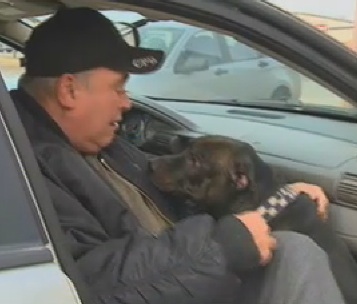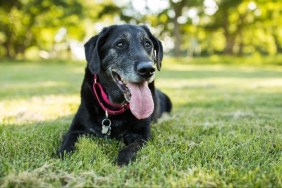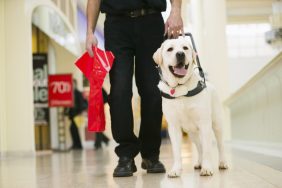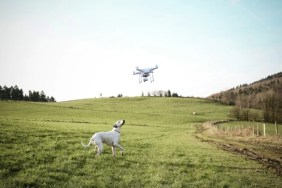Jim Sak, a Vietnam veteran, remembers that when he returned to the United States following his military tour of duty, people spit in his face. Forty years later, Sak says he’s receiving a similar reception. The vet — and retired Chicago police officer — now needs a certified service dog since a stroke three years ago left him unable to use the right side of his body. But when Sak and his dog Snickers arrived in Aurelia, Iowa, to help care for his elderly mother-in-law, city officials let the pair know they were not welcome.
Despite vast and overwhelming evidence that Breed Discriminatory Legislation not only doesn’t work, but targets the wrong individuals, Aurelia bans Pit Bull ownership. So, dogs like Snickers are prohibited from residing within city limits. When the Aurelia Town Council informed Sak on December 16 that his dog must be removed by the end of day, Sak felt he had no choice but to comply. (Snickers is now being boarded outside Aurelia.)
But many of us around the country, as well as Pit Bull advocacy organization Animal Farm Foundation (AFF), see the dog’s ordered removal in direct violation of the Americans with Disabilities Act. Under the ADA, separating Sak — a Vietnam vet and 30-year public servant — from his registered service dog (with no history of aggression) would have the “effect of limiting the rights of persons with disabilities…”
Thanks in part to AFF, which has helped secure legal representation in the case and is assisting with mounting boarding fees, a hearing is set for 9:00 a.m. Wednesday morning to determine whether Sak and Snickers will be reunited in Aurelia. Stay tuned for the latest developments; we’ll update this blog as soon as a verdict is announced.
Meanwhile, according to Sak’s wife Peggy Liefer, neither human nor canine have fared well in each others’ absence. “Jim has already fallen once and we had to call 911… We need his service dog back.” And reportedly, Snickers is so anxious having to live away from his family, he’s developed hives.
Says AFF Community Engagement Specialist Kim Wolf:
“We are hopeful that the federal court will recognize this service dog as essential for keeping Officer Sak safe and out of harm. This dog has been extensively trained and has already proven capable of assisting with these tasks, without posing any risk to the public safety. The dog’s physical appearance has no effect on his ability to keep Officer Sak safe and secure.”









